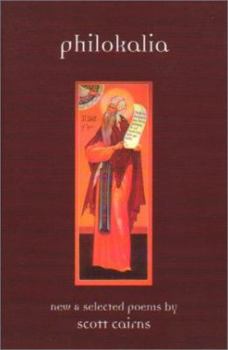Philokalia
No Synopsis Available.
Format:Paperback
Language:English
ISBN:0970817738
ISBN13:9780970817730
Release Date:January 2002
Publisher:Zoo Press
Length:163 Pages
Weight:0.57 lbs.
Dimensions:0.5" x 5.5" x 8.4"
Related Subjects
PoetryCustomer Reviews
5 ratings
Beautiful Work
Published by Thriftbooks.com User , 19 years ago
I just listened to this man do a reading in Marfa, Texas (of all places) and had to buy this book. You do not have to be a Christian to appreciate his work, anyone who seeks God in beauty and life is likely to find this deeply amusing and inspiring. He has a way of making one laugh in one breath, and pause in wonder in the next. If you have a chance to see him read, I would highly recommend it. If you don't, read his work. It has been a long time since I have purchased "modern" poetry - and this is well worth the expense.
Scott Cairns is an inspiration
Published by Thriftbooks.com User , 21 years ago
I took a literature class with Scott Cairns, and (I have to be honest) he is absolutely enchanting. I've never heard a man read poetry quite like he can--drawing out meanings without imposing his "self" upon the words. I was so impressed by his teaching style that I began investigating his work, and I was enthralled all over again.Philokalia is a exploration of the spiritual, but it's also incredibly grounded; Cairns never loses sight of the ~body~ (and yes, sometimes "it hurts to see"). I think that tomorrow's literature classes will be citing Cairns as one of the most profound poets of this time period.Scott's work has been (and I most sincerely hope) will continue to be an inspiration for me.
Subtitle: new & selected poems
Published by Thriftbooks.com User , 22 years ago
This collection includes selected poems from The Theology of Doubt (1985), The Translation of Babel (1990), Figures for the Ghost (1994) and Recovered Body (1998). The last, Recovered Body, is the only one of these that I have read. If the selection from it is representative, a significant portion of memorable poems has been excluded for this collection. The strongest poems in Recovered Body, "The Recovered Midrashim of Rabbi Sab" in included in part - this group of poems are insightful and unusual takes on scriptural stories.From The Translation of Babel comes an excellent string of poems "The Translation of Raimundo Luz" which in a series of related poems ("My Infancy", "My Personal History", "My Language", "My Moral Dream", "My Imitation", "Our Lost Angels" ...) manages to explicate liberation theology in the best poetic, "post-modern" sense through the confounding of the life/personality of Raimundo Luz and Christ. From the same book comes a delightful homage to Calvino "Lost Cities: Calvino" and a wonderfully sassy "Lucifer's Epistle to the Fallen" with delightful lines: "Him! Showboat with the Heavy Thumbs! Pretender / at Creation! Maker of Possibilities!" combined with insightful images: "Imagine! The ignorance you're dressed in! / The way you wear it! ..."In the new poems severals of the "Adventures in New Testament Greek" stand out as serious, playful analysis of key Biblical terms: Metanoia, Haireis, Nous, Mysterion ...While the collection will appeal especially to those with an interest in religious poetry, this collection is solid poetry - worth consideration simply as excellent poetry.
Unique and ongoing project in poetics/theology
Published by Thriftbooks.com User , 22 years ago
The early poems are charming enough, but something absolutely uncanny happens as you chart the course from the second book (Translation of Babel) through the new poems section--an unusual (I'd say unique) poetic enterprise that opens up the possibility of the transcendent, but not a disembodied transcendent, rather a sense of the Holy made manifest in matter, matter that is lovingly attended.
Gorgeous Wisdom
Published by Thriftbooks.com User , 22 years ago
W. B. Yeats once said: "Rhetoric is a quarrel with others; poetry is a quarrel with oneself." What's remarkable about these poems is the shapeliness of their arguments, their rhetorical constructions. In the new poems collected here, one can overhear Cairns' speaker quarreling with himself in the considered measures of accomodation and uneasy transcendence. These poems remind us that great poems are great arguments drawn forward by a literary troika of phanopoeia, logopoeia, and melopoeia--not simply the pyrotechnics of dazzling wordplay, as is often the case these days. Cairns has fallen in love with reality. As God--or the supposed person of God--says in his dialogues with the great mystic, St. Catherine of Siena: "If you have received my love sincerely without self-interest, you will drink your neighbor's love sincerely. It is just like a vessel that you fill at the fountain. If you take it out of the fountain to drink, the vessel is soon empty. But if you hold your vessel in the fountain while you drink, it will not get empty: indeed, it will always be full." An extraordinary charity suffuses and defines the character of this work throughout. Whether the speakers of these poems find their cups empty or full is not so much a question of fate but of the vessel's angle or attitude of repose. These poems possess a charm far beyond their ecclesiastical sway, and we are lucky to have them. If there were only one poet for whom I could be the evangelist, it would be Scott Cairns.






